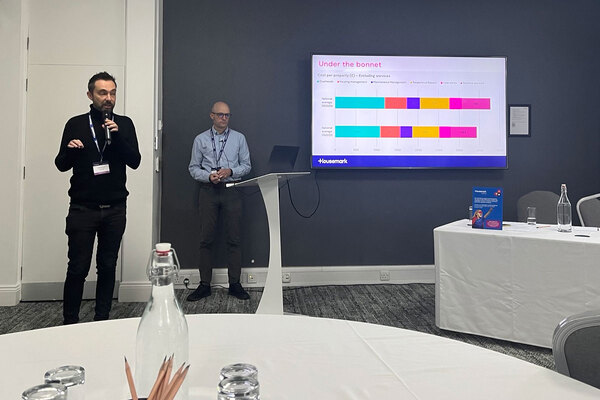You are viewing 1 of your 1 free articles

Nick Atkin is chief executive of Yorkshire Housing
The main themes that should dominate the housing sector in 2024
Nick Atkin looks ahead to the challenges and opportunities that social landlords face in the coming year
The year of the customer
The Social Housing (Regulation) Act 2023 received Royal Assent last July. In April, it’ll come into force and will introduce a multitude of reforms for the sector, with an emphasis on improving the experience of customers and extending the enforcement powers of the Regulator of Social Housing.
Key to getting this right will be our relationship with our customers and our ability to transform our customer experience. You can’t transform something you know very little about, so getting to know what our customers really want and then using this as a basis for how we deliver improvement must be a priority.
We also need to continue to use complaints as an opportunity to learn and improve our service. We know that sharing lessons learned with colleagues helps to create a culture of transparency and accountability, as well as ensuring they see things through a customer rather than organisational lens.
Data-led decision making
What happened at Grenfell and the tragic death of Awaab Ishak have put the sector’s approach to data and record-keeping under the spotlight.
A myriad of different systems, spreadsheets and silos have created the perfect storm that have led to some of the worst failings the sector has ever witnessed. This has understandably placed our purpose and reputation under increased scrutiny.
The combination of data with context and human experience is the Holy Grail. By using these two things together, we can dramatically improve how we operate, while transforming the lives of our customers. We’re able to better spot emerging trends, meet our customers’ expectations and recognise and reward innovation.
Alongside this, boards must robustly challenge the information they see and ask how confident the organisation is of the accuracy of information that’s being presented. Only by doing so can we increase accountability and improve standards.
Then there’s the economy
Last year was tough. The cost of living crisis hit housebuilding hard, increasing the cost of building materials and the availability of labour. High interest rates created a dip in consumer confidence and new completions dropped to their lowest levels since the pandemic.
Unfortunately, while new housing starts dropped by 13% last year, the number of people waiting for suitable housing continued to grow.
With an increase in funding for affordable housing projects this year, experts are predicting a 7% increase in new social housing starts and another 5% in 2025. The Bank of England also expect inflation to fall to around 3% this year, which will help housing associations and developers build more homes.
However, this must be framed within the context of an uncertain economic outlook. Recent figures show the UK is at risk of recession and the continuation of high interest rates, coupled with the significant number of people who are coming off fixed-rate mortgages in the first half of 2024, is likely to lead to a continued sluggish housing market as well as lower levels of economic growth.
We know that both our customers and colleagues are facing significant challenges. Now more than ever they need our support, while also delivering on our core purpose. That’s why we must continue to make sure every decision we make represents value for money for our customers as well as maintaining our business viability.
Housing and politics
At some point this year, the prime minister will call a general election. It could be as early as May, although most pundits are saying an autumn election is most likely.
Housing is expected to be one of the key battlegrounds in the run-up to the next election, with all three main political parties committing to building more homes in some way, shape or form. However, there remains a lack of clarity around what can be delivered in the context of a tight fiscal position.
The calls for a long-term plan for housing are loud and clear and we must continue to make our case. I made the case for this in my recent Inside Housing article.
Housing associations have a fantastic story to tell about the real difference we make to so many people’s lives. But we also need to be realistic about the challenges we’re facing that are preventing us from doing even more to tackle the housing crisis.
Devolution
There will be a continued move towards increased powers for mayoral authorities. The ‘trailblazer’ deals announced last year will see Greater Manchester and the West Midlands given more housing and regeneration powers, including flexible funding for affordable housing and brownfield land development. Both authorities will also receive flexible funding to support the retrofitting of homes and to improve energy efficiency.
Discussions are ongoing with other devolved structures to explore similar deals to help unlock their potential and meet local housing needs. The need for housing to be at the table with the metro mayors will become more important in 2024 than at any previous time.
Recognising regional context
Every region in England is different. Each town and city face their own unique set of challenges when looking to address local housing need.
The housing market can be very different only a few miles down the road, so recognising regional context is crucial. Aligning housing strategies and resources can help make sure that instead of working against each other, different areas are tackling affordability and other housing issues together.
Only through collaborating across regions can we offer solutions to the other issues that are closely linked to housing, such as planning, the environment and skills and training.
Energy efficiency
In December the government announced it will release an extra £1.25bn in funding toward the Social Housing Decarbonisation Fund. Housing associations are already leading the way and have some of the most energy-efficient homes in the country. This additional funding will help to tackle fuel poverty and give housing associations the confidence to plan and deliver more energy efficiency projects over the next year.
However, more needs to be done. With the cost of energy remaining high, we must continue to invest in improving the energy efficiency of our homes to make them more affordable to live in. Key to the delivery of this will be a joint approach to address the green skills shortage that’s preventing us from making even more progress.
Summary
It’s clear that 2024 will be a year of significant change. With any change also comes an abundance of opportunities. Our new year’s resolution needs to be how we focus on what we can do, rather than what we can’t.
Sign up for our daily newsletter
Already have an account? Click here to manage your newsletters











